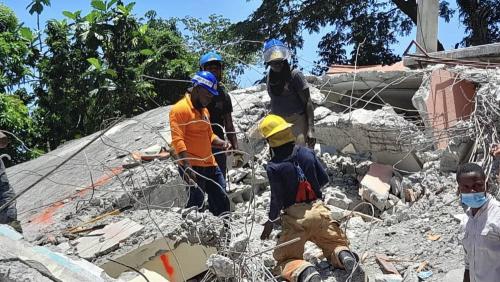At least 1,297 people killed
At least 1,297 people died and more than 5,700 were injured due to collapse of buildings and other accidents. Additionally, according to preliminary reports on infrastructure damage the earthquake destroyed 13,694 homes and 13,785 other buildings.
- Opinión

A powerful earthquake of magnitude 7.2 struck southwestern Haiti on the morning of August 14 at 8:29. Its effects were felt across Haiti and in parts of neighboring countries: Bahamas, Dominican Republic, Jamaica, Puerto Rico, Turks and Caicos Islands and Cuba. The earthquake caused massive economic and human losses in the Haitians departments of Sud, Nippes and Grand’Anse, which were near the epicenter, Petit Trou de Nippes commune. Thousands of houses, hotels, restaurants, and churches collapsed with people inside. Les Cayos, Jérémie, Aquin and Cavaillon are the most affected towns and are almost in ruins. Operations to rescue those trapped under the rubble have been going on continuously since Saturday morning.
According to a recent report by the Haitian Civil Protection Agency issued on August 15, at least 1,297 people were killed and more than 5,700 were injured due to collapse of buildings and other accidents. Of the 1,297 fatalities, 1,054 deaths occurred in the Sud department, 122 in Nippes, 119 in Grand’Anse and two in Nord-Ouest. Preliminary reports on infrastructure damage asserted that the earthquake destroyed 13,694 homes and 13,785 other buildings. The report also noted significant damage to bridges and roads in the affected departments.
According to reports, thousands of people are still missing. Tens of thousands have been displaced from their destroyed or damaged homes. The hospitals in the area have been overwhelmed by injured victims.
The Haitian government declared a state of emergency for a month on August 14 in the evening. At a press conference, interim president Ariel Henry reported that “there are many people under the rubble, especially in hotels and places of worship” and called on the population “not to panic and to fan the feeling of solidarity in the face of this dramatic situation.” Henry assured that the rescue officials will remain deployed and continue to search for the missing people and treat the injured.
While the rescue work is in full swing, the devastation could soon worsen with the passing of the tropical storm Grace through the country. Grace is predicted to reach Haiti tonight. It is likely to cause heavy rain and strong winds for at least one day, which could disrupt the rescue efforts, posing further danger to the lives of those buried under debris and adding to the misery of those without a roof over their head.
For many, the recent earthquake has revoked the horrifying memories of the devastating 7.0 magnitude earthquake in January 2010, which left between 220,000 to 300,000 people dead and 1.5 million affected. After more than 11 years, the country is still recovering from that disastrous earthquake.
The earthquake hit the Latin American and the Caribbean region’s poorest country in the midst of a highly complex situation. Haiti has been going through a delicate political and economic crisis since 2018, which has aggravated by the assassination of its President Jovenel Moise on July 7. The country is struggling with the COVID-19 pandemic, food insecurity, fuel shortage and facing a wave of gang violence.
In these difficult times, a number of regional countries, among others, have expressed their solidarity and offered to assist Haiti. The governments of Mexico, Venezuela, Dominican Republic, the US and Spain, have announced the sending of humanitarian aid to the Caribbean country to contribute to its recovery. In addition to this, Cuban health professionals, providing medical assistance in the country since 1998, are helping in evacuation and treating those injured by the earthquake on site.
Del mismo autor
- Progressive presidential ticket Petro-Márquez receives death threats in Colombia 06/04/2022
- Once again, right wing fails to impeach Peruvian President Pedro Castillo 30/03/2022
- Long before US extradition request, the streets of Honduras cried, ‘Get out JOH narco-dictator’ 17/02/2022
- Second Belmarsh Tribunal on US war crimes to be held in New York 15/02/2022
- Peruvian President swears in fourth ministerial cabinet in six months 09/02/2022
- Haiti’s National Transition Commission elects new interim president and prime minister 01/02/2022
- Colombia registers the 91st massacre of 2021 15/12/2021
- On Human Rights’ Day, UK court permits extradition of Julian Assange to US 10/12/2021
- State of siege in Guatemala is a threat to human rights 05/11/2021
- Global, moral, strategic leadership is urgent says PM of Barbados 05/10/2021
Clasificado en
Clasificado en:
Crisis Ambiental
- Paula Bianchi 07/04/2022
- Leonardo Boff 05/04/2022
- Gabriela Ramírez, OBELA 04/04/2022
- Gabriela Ramírez, OBELA 04/04/2022
- Aviva Chomsky 28/03/2022
